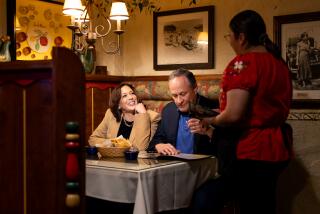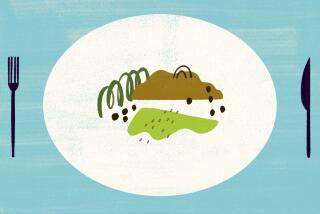Karen Hess, 88; helped create field of food history
Karen Hess, who helped establish American culinary history as a field of study by insisting on primary research as the foundation for her books, lectures and articles about foods and recipes of the 18th and 19th centuries, has died. She was 88.
Hess died May 15 at New York Presbyterian Hospital after suffering a stroke, said her son, Peter. She had been a longtime resident of New York City.
“The Taste of America” (1977), her first book, sounded an alarm for healthier eating. She wrote it with her husband, journalist John L. Hess, when they returned to the United States after living in France for nine years.
Critical of the prepackaged “junk food” that the couple thought was all too common to the American diet, “the book was a scathing statement,” food historian John Martin Taylor told The Times on Monday.
“The Hesses wanted to see more farmers markets and inner-city greengrocers,” Taylor said. “Now we have all of that, but not then.”
Karen Hess next became interested in cookbooks from the Colonial era and Revolutionary War. At the time, most historians thought that food history was too frivolous a topic.
“Academic food history didn’t exist, at all,” Barbara Haber, former curator of the Schlesinger Library at Harvard University, told The Times.
Hess began to update the cookbooks, replacing archaic terms with familiar words, annotating uncommon recipe ingredients and writing introductions that added historical context. In some cases she adjusted measurements to correspond with current standards.
One of her first works, “Martha Washington’s Booke of Cookery” (1981), is considered by some historians to be one of Hess’ most important. It is a family cookbook that Washington used for many years and later handed down to family members.
“Karen thought about food historically, asking what indigenous foods people ate and why,” Haber said.
Other books Hess worked on include “Mary Randolph’s Virginia Housewife” (1984), a cookbook originally published in 1824 with tips on how to cure bacon, make lavender water and starch.
She was the author of “The Carolina Rice Kitchen: The African Connection” (1992), which was first published in 1901 to encourage the local rice business. In her dedication, Hess acknowledged all the African American women who created and developed recipes that found their way into the book.
Hess edited “What Mrs. Fisher Knows About Old Southern Cooking” (1995), originally published in 1881 and one of the oldest known books by an African American woman. Its author, Abby Fisher, was a freed slave who worked as a private cook in finer San Francisco homes. Hess annotated the book’s recipes for gumbos, ice creams, pickling and jams, and wrote an afterword.
“Karen was highly rigorous in her research,” said food historian Andrew F. Smith, who teaches at the New School in New York City. “If you made a statement, you’d better be able to document it. Thanks to Karen, we all use primary sources now.”
She was born Karen Loft in Blair, Neb., on Nov. 11, 1918. After graduating from San Jose State, she married John Hess in the late 1940s. Hess became a Paris-based correspondent for the New York Times in the late 1960s. There, the couple developed a serious interest in food.
In addition to her son Peter, Hess is survived by another son, Michael; a daughter, Martha; and two grandchildren. Her husband died in 2005.
More to Read
Sign up for our Book Club newsletter
Get the latest news, events and more from the Los Angeles Times Book Club, and help us get L.A. reading and talking.
You may occasionally receive promotional content from the Los Angeles Times.






